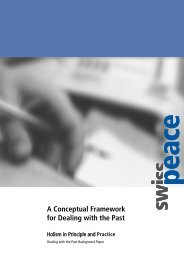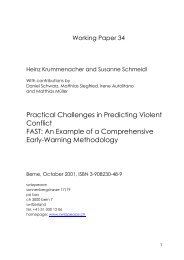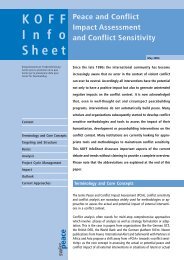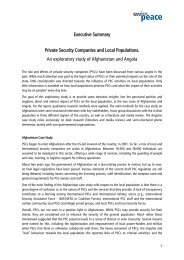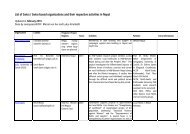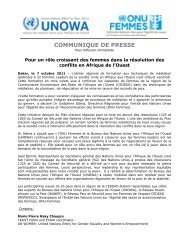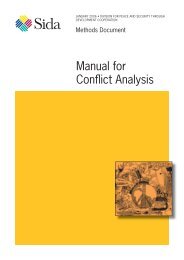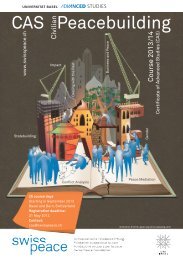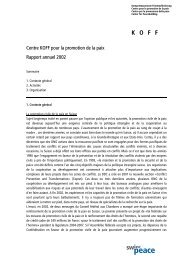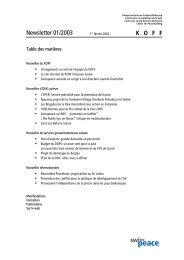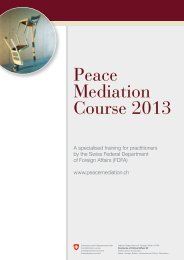Unpacking the Mystery of Mediation in African Peace ... - Swisspeace
Unpacking the Mystery of Mediation in African Peace ... - Swisspeace
Unpacking the Mystery of Mediation in African Peace ... - Swisspeace
You also want an ePaper? Increase the reach of your titles
YUMPU automatically turns print PDFs into web optimized ePapers that Google loves.
<strong>Unpack<strong>in</strong>g</strong> <strong>the</strong> <strong>Mystery</strong> <strong>of</strong> <strong>Mediation</strong> <strong>in</strong> <strong>African</strong> <strong>Peace</strong> Processes<br />
Nor<strong>the</strong>rn Uganda, Juba Negotiations<br />
By David Lanz, <strong>Mediation</strong> Support Project, swisspeace<br />
In a Nutshell<br />
The Juba talks between <strong>the</strong> government <strong>of</strong><br />
Uganda (GoU) and <strong>the</strong> Lord’s Resistance Army<br />
(LRA) <strong>of</strong>ficially started on 18 July 2006 under<br />
<strong>the</strong> mediation <strong>of</strong> Vice-President <strong>of</strong> <strong>the</strong> Government<br />
<strong>of</strong> Sou<strong>the</strong>rn Sudan (GoSS) Riek Machar.<br />
On 26 August 2006, <strong>the</strong> parties signed a document<br />
on <strong>the</strong> Cessation <strong>of</strong> Hostilities (CoH),<br />
which provided for <strong>the</strong> regroup<strong>in</strong>g <strong>of</strong> LRA fighters<br />
<strong>in</strong> two designated assembly po<strong>in</strong>ts <strong>in</strong> Sou<strong>the</strong>rn<br />
Sudan. The CoH <strong>in</strong>stituted a Cessation <strong>of</strong> Hostilities<br />
Monitor<strong>in</strong>g Team (CHTM) led by <strong>the</strong><br />
Sudan People’s Liberation Army. The negotiations<br />
cont<strong>in</strong>ued, but difficulties emerged <strong>in</strong> late<br />
2006, as <strong>the</strong> parties violated <strong>the</strong> CoH and <strong>the</strong><br />
LRA voiced dissatisfaction about <strong>the</strong> process. The<br />
talks were thus <strong>in</strong>terrupted, and new mediators<br />
were brought <strong>in</strong>, <strong>in</strong> particular <strong>the</strong> Special Envoy<br />
<strong>of</strong> <strong>the</strong> UN Secretary-General for <strong>the</strong> areas affected<br />
by <strong>the</strong> LRA, Joaquim Chissano, who was appo<strong>in</strong>ted<br />
<strong>in</strong> December 2006.<br />
The talks were taken up on 2 May 2007, <strong>the</strong> parties<br />
signed <strong>the</strong> Agreement on Comprehensive Solutions<br />
to tackle <strong>the</strong> root causes <strong>of</strong> <strong>the</strong> conflict <strong>in</strong><br />
Nor<strong>the</strong>rn Uganda. Roughly two months later on<br />
29 June 2007, <strong>the</strong> parties signed <strong>the</strong> Agreement<br />
on Reconciliation and Accountability, which provided<br />
a framework for deal<strong>in</strong>g with <strong>the</strong> past <strong>in</strong><br />
Nor<strong>the</strong>rn Uganda and for address<strong>in</strong>g <strong>the</strong> International<br />
Crim<strong>in</strong>al Court (ICC) <strong>in</strong>dictments <strong>of</strong> four<br />
senior LRA leaders. In fall <strong>of</strong> 2007, <strong>the</strong> context <strong>of</strong><br />
<strong>the</strong> talks changed due to <strong>the</strong> assass<strong>in</strong>ation <strong>of</strong><br />
Kony’s deputy V<strong>in</strong>cent Otti. Negotiations were<br />
taken up <strong>in</strong> January 2008 and concluded with<strong>in</strong> a<br />
month: On 29 February 2008, an annex to <strong>the</strong><br />
Agreement on Reconciliation and Accountability<br />
was signed, followed by <strong>the</strong> agreements on DDR<br />
and Implementation on 2 March 2008.<br />
The f<strong>in</strong>al peace accord was supposed to be signed<br />
<strong>in</strong> mid-April 2008 by Ugandan President Yoweri<br />
Kaguta Museveni and LRA leader Joseph Kony,<br />
but <strong>the</strong> latter failed to turn up to <strong>the</strong> sign<strong>in</strong>g<br />
ceremony.<br />
60<br />
Key Messages<br />
Self-<strong>in</strong>terested mediator: The GoSS became <strong>in</strong>volved<br />
as a mediator because it had a manifest<br />
self-<strong>in</strong>terest <strong>in</strong> neutraliz<strong>in</strong>g <strong>the</strong> security threat that<br />
<strong>the</strong> LRA posed on its territory and <strong>in</strong> satisfy<strong>in</strong>g<br />
Acholi groups with<strong>in</strong> South Sudan. Self<strong>in</strong>terested<br />
mediators can be effective because <strong>of</strong><br />
<strong>the</strong>ir leverage over <strong>the</strong> parties and commitment to<br />
<strong>the</strong> process.<br />
“Los<strong>in</strong>g” <strong>the</strong> ANSA leadership: The leaders <strong>of</strong> an<br />
armed non-state actor (ANSA) cannot always be<br />
present at <strong>the</strong> talks, which poses <strong>the</strong> risk that <strong>the</strong><br />
talks advance without <strong>the</strong>ir consent, giv<strong>in</strong>g <strong>the</strong>m<br />
<strong>the</strong> feel<strong>in</strong>g <strong>of</strong> be<strong>in</strong>g out-maneuvered by <strong>the</strong>ir<br />
agents. This can produce a backlash and lead to<br />
<strong>the</strong> withdrawal <strong>of</strong> an ANSA from a peace process<br />
at <strong>the</strong> last m<strong>in</strong>ute.<br />
Perils <strong>of</strong> forum-shopp<strong>in</strong>g: The parties are likely to<br />
blame <strong>the</strong> mediators when <strong>the</strong>y feel unsatisfied<br />
with <strong>the</strong> process. They may <strong>the</strong>n try to f<strong>in</strong>d a new<br />
mediator. This “forum-shopp<strong>in</strong>g” can seriously<br />
underm<strong>in</strong>e a process. International backers <strong>of</strong><br />
peace negotiations should prevent this by honor<strong>in</strong>g<br />
<strong>the</strong>ir commitment to <strong>the</strong> <strong>in</strong>itial mediator.<br />
Impact <strong>of</strong> <strong>the</strong> ICC: Despite its legal mandate, <strong>the</strong><br />
ICC had an important political impact on <strong>the</strong><br />
Juba talks. The <strong>in</strong>dictments aga<strong>in</strong>st senior LRA<br />
leaders put pressure on <strong>the</strong> group and contributed<br />
to br<strong>in</strong>g<strong>in</strong>g it to <strong>the</strong> negotiat<strong>in</strong>g table. The ICC<br />
also <strong>in</strong>fluenced <strong>the</strong> structure <strong>of</strong> <strong>the</strong> negotiations,<br />
mak<strong>in</strong>g issues <strong>of</strong> transitional justice its central focus.<br />
F<strong>in</strong>ally, <strong>the</strong> <strong>in</strong>dictments made it difficult to<br />
satisfy <strong>the</strong> security concerns <strong>of</strong> <strong>the</strong> LRA, which<br />
complicated <strong>the</strong> conclusion <strong>of</strong> <strong>the</strong> Juba talks.<br />
<strong>Peace</strong> dividends even without agreement: The Juba<br />
talks did not <strong>of</strong>ficially succeed, as <strong>the</strong> LRA did<br />
not sign <strong>the</strong> f<strong>in</strong>al peace agreement. They none<strong>the</strong>less<br />
had a positive impact <strong>in</strong> terms <strong>of</strong> stabiliz<strong>in</strong>g<br />
<strong>the</strong> security situation <strong>in</strong> Nor<strong>the</strong>rn Uganda. As<br />
a result, close to one million IDPs were able to return<br />
home.




